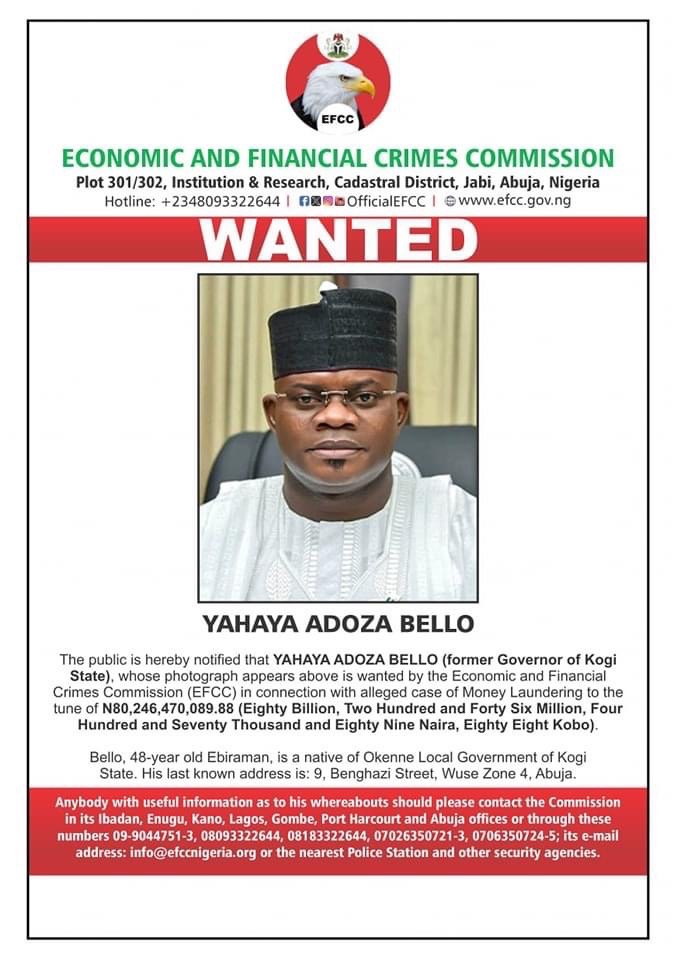The Economic and Financial Crimes Commission (EFCC) of Nigeria has declared Yahaya Bello, the former Governor of Kogi State, wanted in connection with an alleged financial fraud amounting to N80.2 billion. The announcement marks a critical phase in the investigation as the agency intensifies its search for Bello.
Allegations and Public Notice
The EFCC has taken to social media and other public platforms to disseminate the information, signaling the urgency and severity of the matter. A post shared on the EFCC’s official Facebook page explicitly states, “Former Kogi State Governor, Yahaya Bello, is wanted by the EFCC for offences relating to economic and financial crimes to the tune of N80.2 billion.” Accompanying the text was a call to action for citizens, urging anyone with knowledge of Bello’s whereabouts to report immediately to the commission or the nearest police station.

Background of the Case
Yahaya Bello, who served as the Governor of Kogi State, has been under scrutiny by the EFCC for various allegations of corruption and misappropriation of state funds during his tenure. The specific details of the case involve substantial financial transactions and budgetary allocations that the EFCC claims are unaccounted for, leading to significant losses to the state treasury.
Implications for Governance and Anti-Corruption
This high-profile designation of Bello as a wanted individual underscores the Nigerian government’s renewed commitment to combating corruption within its ranks. The move is part of a broader strategy by the EFCC to ensure accountability and transparency, especially concerning public officials and the management of state resources. By publicly announcing the search for Bello, the EFCC not only reaffirms its dedication to rooting out corruption but also seeks to deter similar misconduct by other officials.
The Role of Public Involvement
The EFCC’s appeal to the public for assistance in locating Bello highlights the role of civic engagement in the fight against corruption. This strategy aims to leverage community resources and awareness, which can often lead to crucial tips that assist law enforcement agencies. It also serves to raise public awareness about the seriousness of corruption and the active measures being taken to address it.
Legal and Judicial Processes
Following Bello’s eventual apprehension, the legal proceedings will be closely watched as they will likely set precedents for how high-profile corruption cases are handled in Nigeria. The judiciary’s handling of the case will be a test of the legal system’s independence and its ability to prosecute powerful political figures. It will also potentially influence public confidence in the government’s ability to enforce the law impartially.
Challenges in Tracking High-Profile Figures
The task of locating and apprehending high-profile figures like Yahaya Bello presents significant challenges. Such individuals often have the resources to evade capture and can sometimes receive protection from powerful sympathizers, complicating efforts to bring them to justice. The EFCC’s call to the public is thus a crucial component of their strategy, relying on nationwide vigilance.
Impact on Political Landscape
The declaration of Yahaya Bello as wanted is likely to have ripple effects across the political landscape of Nigeria, particularly in Kogi State where he held office. It sends a strong message to other politicians and serves as a reminder of the consequences of mismanaging public funds. The situation also poses questions about political accountability and the measures in place to prevent the abuse of power.
Conclusion
As the search for former Governor Yahaya Bello continues, the EFCC’s proactive stance demonstrates a significant shift towards greater enforcement of anti-corruption laws in Nigeria. The outcome of this case will be pivotal, potentially heralding a new era of governance where transparency and accountability are at the forefront. The public, legal experts, and political analysts will be watching closely, as the actions taken now will undoubtedly influence the future of anti-corruption efforts in the country.



